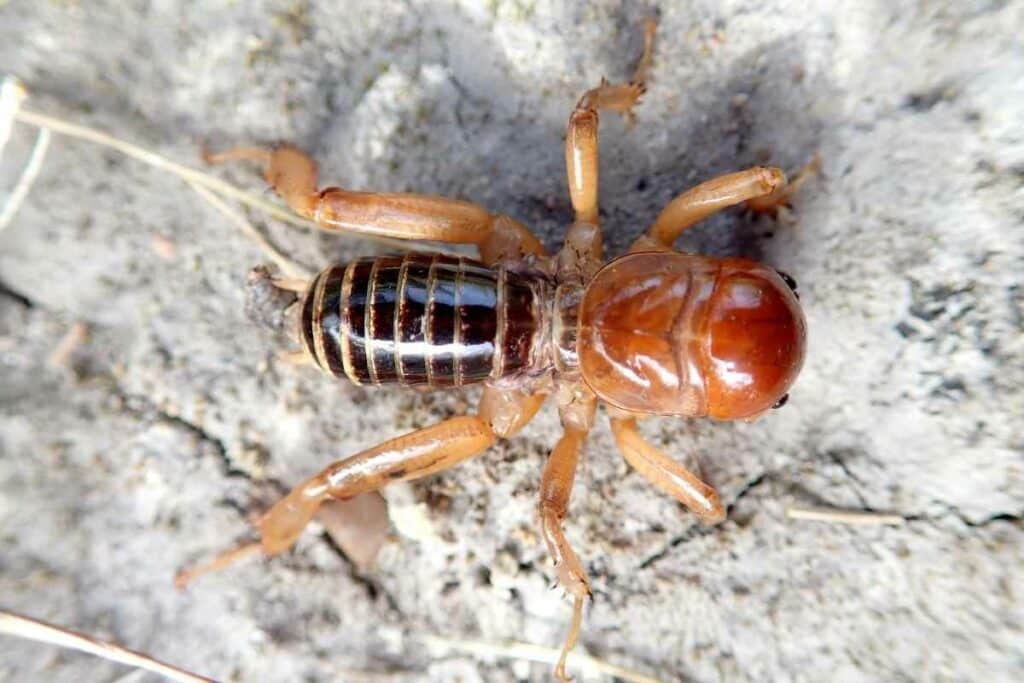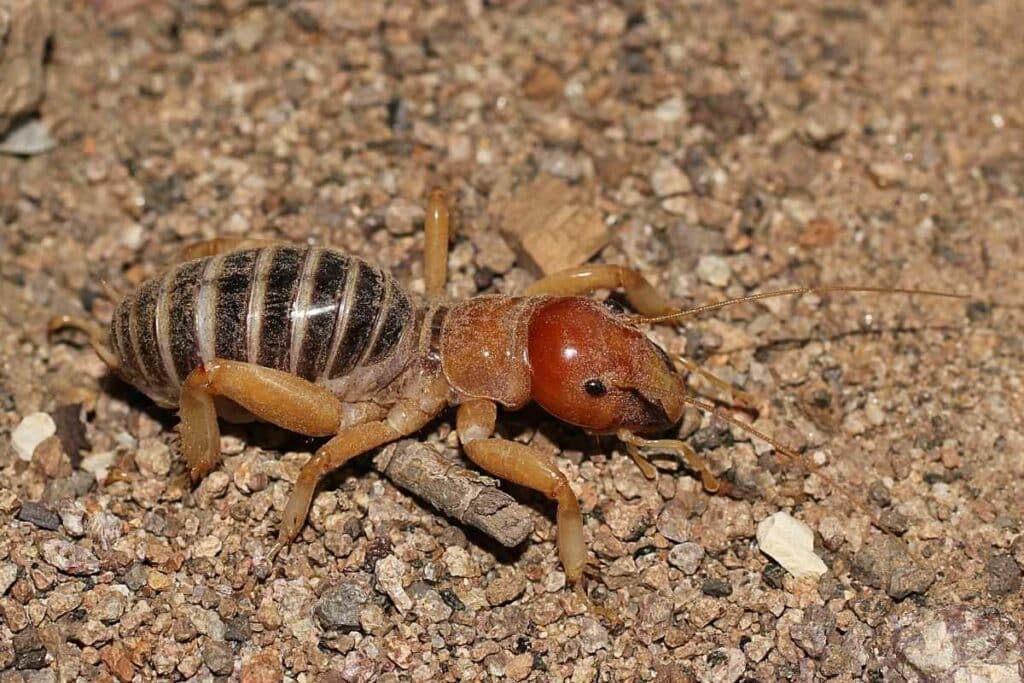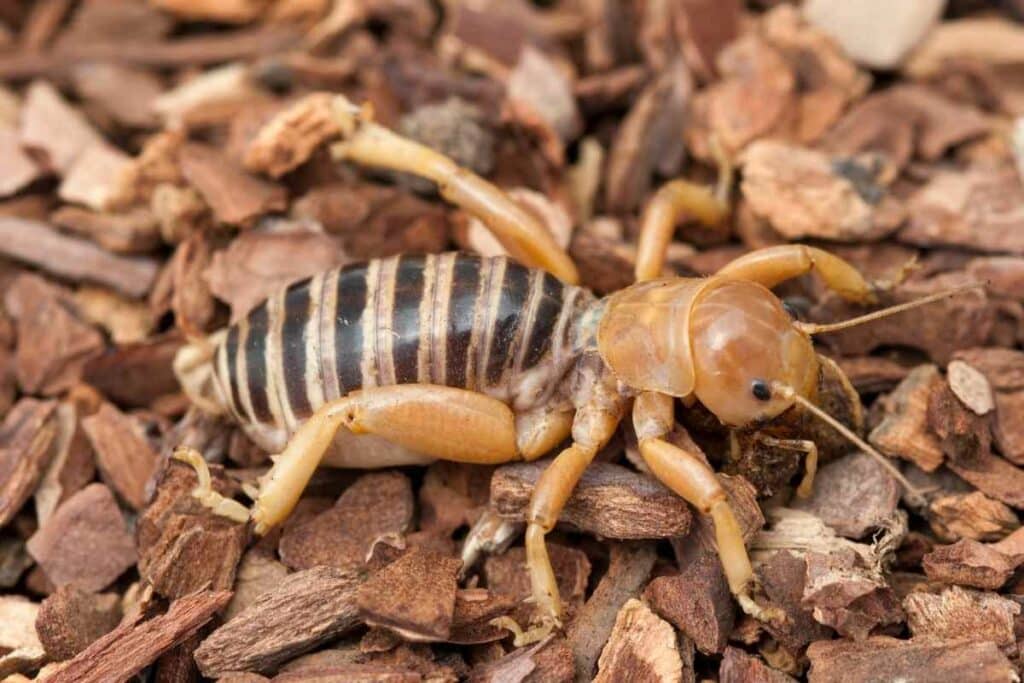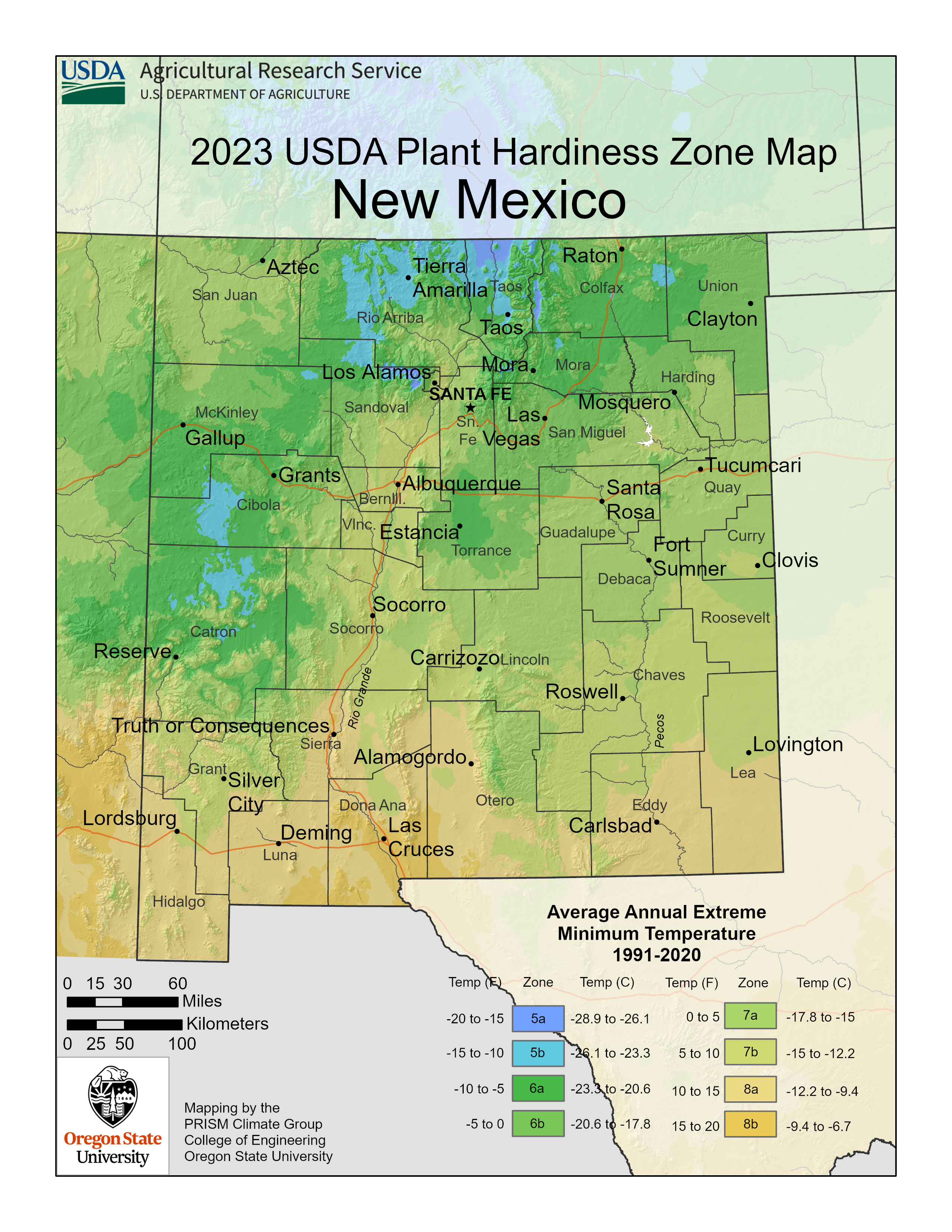If you are out west you are highly likely to have encountered this somewhat strange bug, that is often mistaken for a large spider.
If a potato bug, also known as Jerusalem cricket, turns up in your home it could give a nasty surprise, but thankfully this unusual member of the grasshopper family is not venomous. Though like other crickets and locusts, potato bugs are capable of giving you a painful bite, they are not poisonous.
Do you want to know more about one of America’s largest crickets?
If yes, read on for a concise guide with all the essentials on this intriguing bug!
What Is a Jerusalem Cricket (Potato Bug)?
Potato bug is the common name of Stonopelmatus fuscus, the Jerusalem cricket.
It is a member of the orthoptera family and is related to locusts and grasshoppers.

It is known by a large number of alternative or folk names, based on its striking appearance, that include:
- Who-tzi-Neh – the old bald-headed Man, a Native American name
- Nina de la Tierra – child of the earth, a Spanish name
- Skull insect
- Red skull bug
- Sand cricket
- Stone cricket
If You Have Never Seen a Jerusalem Crickets Before, Its Appearance May Alarm
When you see a potato bug, you will understand why it has such descriptive names.
Its large, almost humanoid or skull-like head is bold and shiny, unlike other crickets. They have two dark eyes with long antennae beneath the eyes.
These wingless insects are unusually fleshy and alien-like:
- Be prepared for the large size of the Jerusalem cricket as it can be up to 8 centimetres long.
- They have two dark eyes with long antennae beneath them.
- Its bulbous thorax is often yellow-brown with thick legs and it has alternating dark and light brown bands on its abdomen.
- The legs of the potato bug also carry strong dark digging spines.
The Potato Bug Is Certainly an Insect of the Wild West
Potato bugs are native to southwestern states like:
- Arizona
- Nevada
- and New Mexico
They are used to the wilderness life and eat a varied and opportunistic diet of insects, carrion and the tubers (potatoes) they encounter underground.
The Powerful Jaws of the Jerusalem Crickets Can Give a Nasty Bite!
The potato bug is more than capable of delivering a nasty bite if provoked or handled carelessly.
Their mandibles, which sit beneath are powerful and large, more than capable of clamping down on a hand or finger.

The jaws are so powerful that they can easily cut through insect nets and plastic bags.
They are not venomous and do not have a poison gland. Nevertheless, their bite causes short-lived intense pain.
If you suffer a bite from a potato bug, it is unlikely to cause anything more than localised pain and swelling. Clean the wound thoroughly and keep it dry.
Learn More: Want to know more about bites from crickets and grasshoppers? Why not read the article “Do Grasshoppers Bite? Are They Dangerous?”
Jerusalem Crickets Prefer to Remain Elusive
Because they are large and cumbersome, potato bugs are slow-moving and prefer to stay hidden underground in their burrow during the day.
They cannot jump or fly like other grasshoppers. Daytime sightings of them are rare unless they are out looking for a mate.
In the evening and night when they emerge, they move slowly and are generally solitary. They are effective diggers and will burrow to hide.
You might find potato bugs beneath rocks, stones or logs. Sometimes they may wander into properties to seek shelter.
If you encounter a Jerusalem cricket, it will probably play dead and will crawl away slowly if left undisturbed.
The Lifecycle of the Jerusalem Crickets
Sightings of potato bugs are infrequent, which has meant that the seasonal patterns of behaviour of this insect have been difficult to characterise.
They are thought to live for up to two years.
They spend most of their time underground but will surface in the daytime during the spring to go in search of a mate.
Unlike other crickets, they do not chirp, but they can make a low drumming noise with their abdomens as a mating call.
Defense Mechanism: They also hiss when disturbed by rubbing the spines on their abdomens producing a sound like rubbing two pieces of sandpaper.
Jerusalem Crickets Are Not Pests
Despite their appetite for tubers, potato bugs are not a pest species.
They simply do not multiply in large enough numbers to do significant damage and have several other sources of food.
Their burrowing and consumption of dead material by potato bugs is certainly a positive contribution to soil health.

Potato bugs cause most problems when they innocently wander onto human settlements.
They may inadvertently enter a bedroom or become exposed in a backyard, giving an unsuspecting resident a nasty surprise.
Its strange appearance means it can be easily mistaken for a fiendish spider.
The name “Jerusalem” cricket actually comes from the exclamation of surprise people would make when seeing this insect for the first time!
If You Encounter a Potato Bug, You Can Scoop It up and Move It Elsewhere
There is no need for pest control or eradication techniques as these bugs simply cannot generate the numbers to infest a location.
A solitary potato bug just needs to be picked or scooped up and moved elsewhere. It will play dead when handled and only bites as a last resort.
Rounding Up
Potato bugs are probably the last creature you want to find on your bed before you go to sleep, but they are remarkable insects that are docile.
They are unlikely to bite, and even if they do, it is a non-venomous nip that quickly resolves.
And despite the name, your potatoes are unlikely to be damaged by them!


